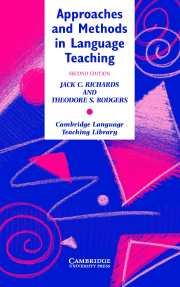Book contents
- Frontmatter
- Contents
- Preface
- Part I Major language trends in twentieth-century language teaching
- Part II Alternative approaches and methods
- 5 Total Physical Response
- 6 The Silent Way
- 7 Community Language Learning
- 8 Suggestopedia
- 9 Whole Language
- 10 Multiple Intelligences
- 11 Neurolinguistic Programming
- 12 The lexical approach
- 13 Competency-Based Language Teaching
- Part III Current communicative approaches
- Author index
- Subject index
13 - Competency-Based Language Teaching
Published online by Cambridge University Press: 06 July 2010
- Frontmatter
- Contents
- Preface
- Part I Major language trends in twentieth-century language teaching
- Part II Alternative approaches and methods
- 5 Total Physical Response
- 6 The Silent Way
- 7 Community Language Learning
- 8 Suggestopedia
- 9 Whole Language
- 10 Multiple Intelligences
- 11 Neurolinguistic Programming
- 12 The lexical approach
- 13 Competency-Based Language Teaching
- Part III Current communicative approaches
- Author index
- Subject index
Summary
Background
Most of the methods and approaches described in this book focus on inputs to language learning. The assumption is that by improving syllabuses, materials, and activities or by changing the role of learners and teachers, more effective language learning will take place. Competency- Based Education (CBE) by comparison is an educational movement that focuses on the outcomes or outputs of learning in the development of language programs. CBE addresses what the learners are expected to do with the language, however they learned to do it. The focus on outputs rather than on inputs to learning is central to the competencies perspective. CBE emerged in the United States in the 1970s and refers to an educational movement that advocates defining educational goals in terms of precise measurable descriptions of the knowledge, skills, and behaviors students should possess at the end of a course of study. The characteristics of CBE are described by Schenck (1978: vi):
Competency-based education has much in common with such approaches to learning as performance-based instruction, mastery learning and individualized instruction. It is outcome-based and is adaptive to the changing needs of students, teachers and the community. … Competencies differ from other student goals and objectives in that they describe the student's ability to apply basic and other skills in situations that are commonly encountered in everyday life. Thus CBE is based on a set of outcomes that are derived from an analysis of tasks typically required of students in life role situations.
Information
- Type
- Chapter
- Information
- Approaches and Methods in Language Teaching , pp. 141 - 150Publisher: Cambridge University PressPrint publication year: 2001
Accessibility standard: Unknown
Why this information is here
This section outlines the accessibility features of this content - including support for screen readers, full keyboard navigation and high-contrast display options. This may not be relevant for you.Accessibility Information
- 1
- Cited by
